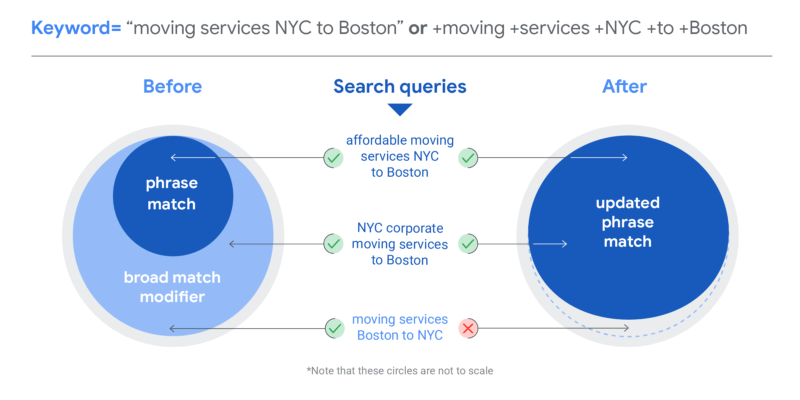
The Breakdown: Phrase Match to Replace Broad Match Modified Keywords in Google Ads
Google Ads recently announced an update to phrase and broad match modified keywords.
As of February 18, 2021, phrase match keywords have started to match the same keywords that broad match modified (BMM) does, which could lead to an increase in traffic for phrase match keywords.
By July 2021, this new version of phrase match will replace BMM. Advertisers can then use phrase match for keywords in the same way that they previously used BMM for. You will also no longer be able to create BMM keywords. Any existing BMM keywords that remain in your account will continue to operate under the new behavior rules.

Simply put, Google is changing the functionality of phrase match. The new phrase match behavior will function exactly like the old broad match modified searches. Google will then have only three standard match types instead of four.
According to Google, this change will improve semantic matching (see image below). In theory, accounts that use many broad match modified keywords (replaced with the new phrase match) will see a slight improvement in the relevance of their search matches.

WebMechanix’s Take
This change is not as dramatic as you might think. Advertisers will have to use phrase matches in the same way they used to use broad match modified keywords moving forward.
Now, Google is back to offering only three match types, all of which will interpret queries more loosely than ever before. Advertisers aren’t technically losing BMM functionality; it’s just called phrase match now.
Old phrase match terms in ad accounts will automatically start to show for more search queries than in the past. If you use lots of phrase match keywords, you’ll need to be vigilant in monitoring your search query history before and after the change. Consistent upkeep of negative keywords will be essential.
An added challenge of the match type change comes from another recent update—Google is reducing the visibility of search term data, withholding about 50% of it in many cases. Therefore, newer accounts with underdeveloped negative keyword lists may see a greater challenge identifying wasteful keywords going forward.
Most industry experts agree that phrase match keywords have become redundant in recent years. Many already use mostly or only exact-match keywords and BMM. It was like having four match types, but one was a worse version of the other.
“I haven’t used phrase match in a few years anyway, so it seems like the final nail in the coffin,” says Ben Williams, Director of Paid Search at WebMechanix. “It was little more than a BMM with a restriction on term order, and it’s rare that term order matters semantically in a way you can’t easily handle with exact match keywords. The more I think about this, the more this update makes sense for big-budget advertisers, but at the expense of the small guys who have a tight budget or very niche traffic.”
If you have a large budget, Google can learn what converts for you more effectively and find semantically relevant searches that are less competitive. However, advertisers with small budgets run into problems since a lot of search data isn’t visible to them, and the Google Ads algorithm isn’t able to find less competitive, relevant keywords as effectively as it can with larger budgets.
Williams believes the bigger question is what Google might do in the future if it sees that marketers still aren’t adopting true broad match at a high enough rate.
What Google Advertisers Should Do
If you follow these best practices, you should be fine. (If you’re one of WebMechanix’s clients, WebMechanix has you covered here.)
- Monitor any performance, budget, or traffic fluctuations from this update.
- Continue to add negative keywords to eliminate irrelevant searches. Understand that Google can identify semantically similar keywords, but it’s not always accurate in identifying similar intents.
- Check your Google Ads search campaigns to understand your level of exposure to old phrase matches, especially if you haven’t been using broad match or BMM keywords.
- Adopt as much of your historically-converting queries from phrase match keywords into exact match as possible, if you haven’t already.
- For the best long-term strategy, diversify your marketing channels so you aren’t dependent on paid search. Consider SEO, Facebook Ads, and so forth.
Also, be warned: Google Ads may suggest some changes in the Recommendations tab, which are usually hit or miss. It also recommends adding broad match with smart bidding for this update, which is something WebMechanix would not advise for the reasons of this match type change alone.
If you do add broad match keywords to your account, monitor them closely. Google takes the most liberty with matching broad keywords, and your results could vary significantly depending on how your account is set up.
In summary, after July, phrase match will function like BMM, and your existing BMM will continue on. Most importantly, this update reinforces the need to vigilantly find and add negative keywords.
Most newsletters suck...
So while we technically have to call this a daily newsletter so people know what it is, it's anything but.
You won't find any 'industry standards' or 'guru best practices' here - only the real stuff that actually moves the needle.





